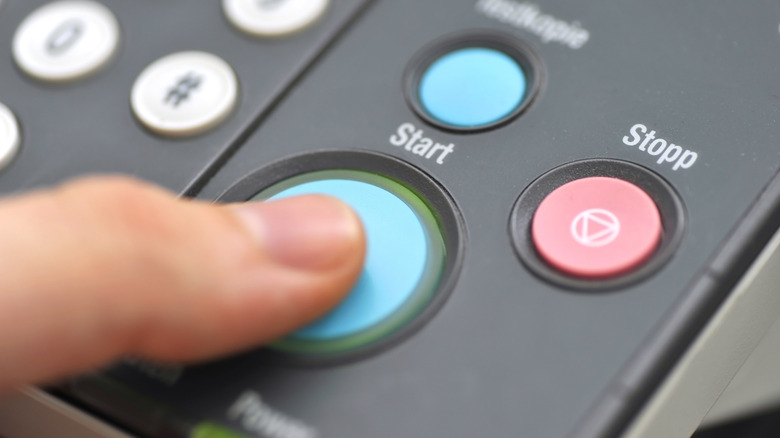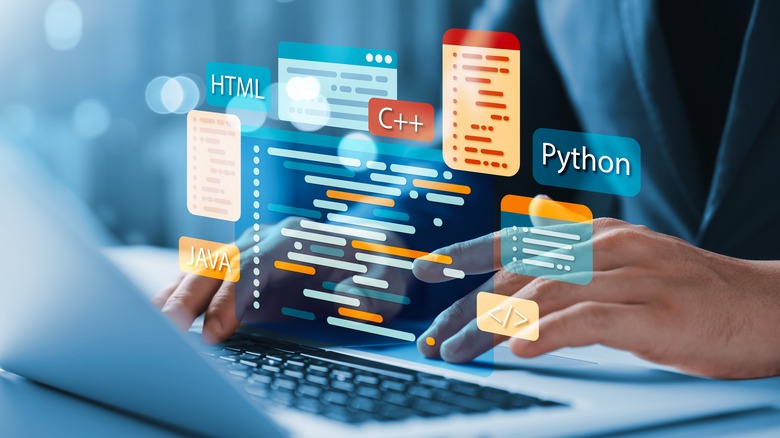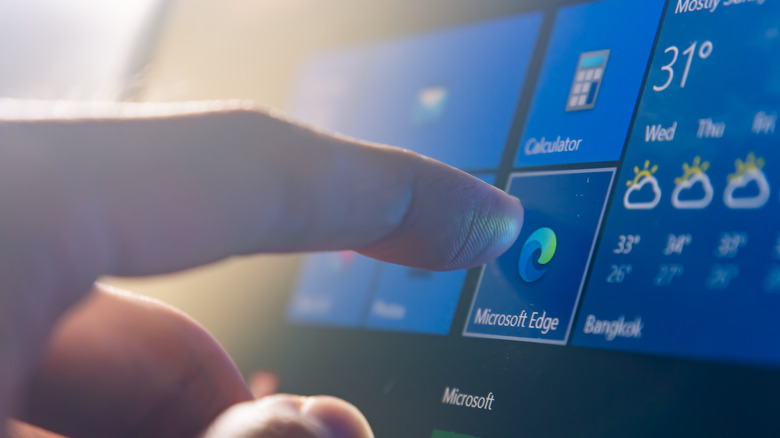Differences Between Software And Programs Explained
If you've been using a personal computer for long enough, you've probably made a habit of interchangeably referring to the applications on your hard drive as programs or software. Both terms have been around for ages, so the precise difference between the two has become a bit muddled. This is why most users wouldn't particularly care if you used one to refer to the other.
However, there are several big distinctions between a program and a piece of software. While knowing the difference isn't that important for casual PC usage, if you're planning on making your own programs or software from scratch, you should definitely know what both are so you don't accidentally create one and call it the other. Whether you're getting into PC development yourself or just want to know a little bit more about how your computer works, let's go over what actually constitutes a program or piece of software and some examples of both.
What is a program, and what does it do?
According to Merriam-Webster Dictionary, the word program is defined as "a plan or system under which action may be taken toward a goal." This is an apt descriptor as far as computer programs are concerned. A program is a compartmentalized combination of computer commands brought together with the purpose of doing exactly one thing. Think of a program like a button that, when pressed, opens a door, out of which comes the result you were looking for.
Here's an example of what it looks like if you break it down to the micro level: You want to perform a virus scan on your computer, so you launch Microsoft Defender (assuming you haven't disabled it in favor of a different antivirus). Within your computer, the command goes out to start up Defender and begin its necessary processes, with the ultimate goal of performing a successful virus scan. All of this can be accomplished through a few lines of simple code.
A program can be made up of as much or as little code as necessary to complete a task, but it's all about that one task. You can't make a program to accomplish multiple unrelated tasks, or at least not without a lot of difficulty and tinkering.
What is software, and what does it do?
A program is like a to-do list for accomplishing exactly one thing, while software offers an entire suite of options. Software is essentially a collection of individual programs, backed by relevant data and configurations, brought together to accomplish their individual purposes toward a greater goal. Think of software like a big control room full of operators, each tasked with doing one thing when called upon.
The simplest example of a piece of software is your PC's own operating system. A computer doesn't have any inherent functionality, but with operating system software, all of the minutiae that come with starting a computer up and accessing its advanced functions becomes as simple as pressing a button or clicking an icon.
A piece of software is intended to perform multiple tasks with a general relation to one another. Microsoft Word, for instance, allows you to type out visual words and sentences, but it also allows you to format those words in various ways, copy and paste from outside the program, access the internet for information lookup and spellcheck, and run print jobs. All of these functions are programs in themselves, brought together as a singular piece of software to help you write.
Types of programs
Because programs have relatively simple functions, they exist near the bedrock of your PC's basic operations. It's the programs that are responsible for putting things in motion and handling simple tasks, usually in the background of your day-to-day PC usage.
Programs are primarily categorized by their level of user-interactivity. An interactive program receives direct input from the user to do its work, with the simplest example being the Windows Command Prompt. You type a command into the prompt; the program makes the command happen. These kinds of programs will remain active until directly terminated by user input, though there are also batch programs that self-terminate after completing their assigned tasks. When you send a job to your connected printer, for instance, that's an example of a batch program doing its one job.
Beyond user interaction, programs can also be sorted into their intended purposes. You have application launchers that boot up a single computer application, utility programs that monitor your PC's performance and defend it from viruses, and most importantly, system programs. The system programs are what handle the moment-to-moment functions of your PC, the stuff you don't even notice like updating video card drivers. If even one of these programs broke, the impact would be immediately noticeable.
Types of software
From the perspective of user input, software serves two overall purposes: System functions and usable applications. System software, like the aforementioned operating system, works to translate and condense the various intricacies of your computer into plain English and visuals without your direct input. Unless you're exceptionally talented at translating binary in your head, for example, you need your PC's language processor to parse all of the incoming commands and display data into clear text on your monitor.
Computer applications, on the other hand, are intended more for your direct use and run the gamut of vital purposes and helpful functions. Your internet browser, for example, is what allows you to connect to the internet at large, while its various plugins allow you to watch videos, type into text boxes, play audio, and so on.
Most of these applications aren't intended to be excessively tinkered with by end-users, though depending on the application's purpose (and how flexible its developer is), there may be some wiggle room. Video games, for example, may have their files completely closed off to those without admin privileges to prevent tampering, or their files could be accessible for modding purposes.
Additional distinctions between software and programs
Besides the baseline differences, there are a few extra distinctions that differentiate programs from software on the practical level. For one, since a program is only intended to do one thing, they're relatively easy to create and can be handled by a single developer. Software, on the other hand, is much more complex and usually requires a full team of developers to create the individual programs and stitch them all together.
Additionally, programs are typically smaller in size than software due to their lack of complexity. A single program may only take up a handful of kilobytes on your hard drive storage, whereas a piece of software could take up megabytes or gigabytes of space due to how many processes they need to run simultaneously and the data required to run those processes or programs.
Finally, individual programs don't usually have their own user interfaces; rather, they usually piggyback off your operating system's display framework to show simple buttons and windows. On the other hand, software has wholly unique user interfaces, compartmentalizing buttons, and functions for users. The main menu in your favorite video game looks like that because the developers deliberately engineered it that way, while Windows Defender virus scan is a program in your Windows settings and doesn't need its own custom UI.





